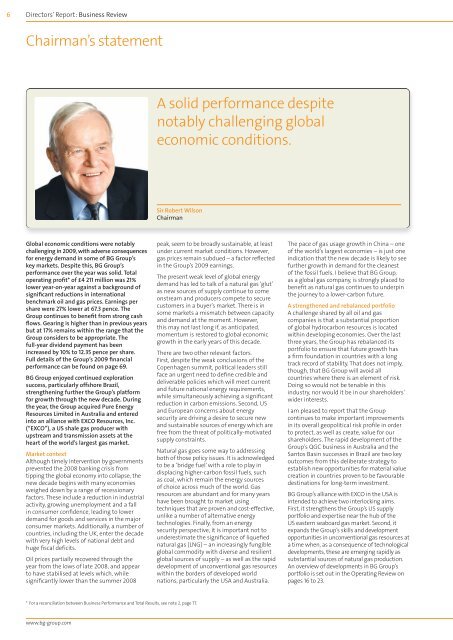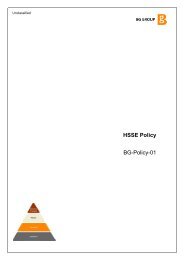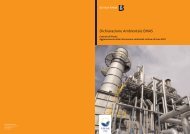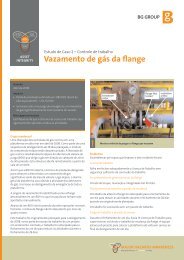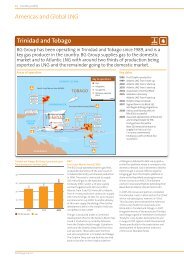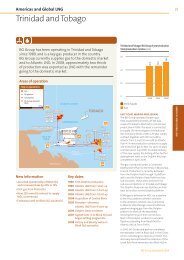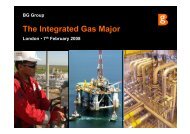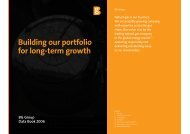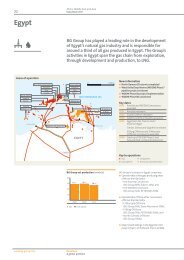Annual Report and Accounts 2009 - BG Group
Annual Report and Accounts 2009 - BG Group
Annual Report and Accounts 2009 - BG Group
Create successful ePaper yourself
Turn your PDF publications into a flip-book with our unique Google optimized e-Paper software.
6<br />
Directors’ <strong>Report</strong>: Business Review<br />
Chairman’s statement<br />
Global economic conditions were notably<br />
challenging in <strong>2009</strong>, with adverse consequences<br />
for energy dem<strong>and</strong> in some of <strong>BG</strong> <strong>Group</strong>’s<br />
key markets. Despite this, <strong>BG</strong> <strong>Group</strong>’s<br />
performance over the year was solid. Total<br />
operating profit* of £4 211 million was 21%<br />
lower year-on-year against a background of<br />
significant reductions in international<br />
benchmark oil <strong>and</strong> gas prices. Earnings per<br />
share were 27% lower at 67.3 pence. The<br />
<strong>Group</strong> continues to benefit from strong cash<br />
flows. Gearing is higher than in previous years<br />
but at 17% remains within the range that the<br />
<strong>Group</strong> considers to be appropriate. The<br />
full-year dividend payment has been<br />
increased by 10% to 12.35 pence per share.<br />
Full details of the <strong>Group</strong>’s <strong>2009</strong> financial<br />
performance can be found on page 69.<br />
<strong>BG</strong> <strong>Group</strong> enjoyed continued exploration<br />
success, particularly offshore Brazil,<br />
strengthening further the <strong>Group</strong>’s platform<br />
for growth through the new decade. During<br />
the year, the <strong>Group</strong> acquired Pure Energy<br />
Resources Limited in Australia <strong>and</strong> entered<br />
into an alliance with EXCO Resources, Inc.<br />
(“EXCO”), a US shale gas producer with<br />
upstream <strong>and</strong> transmission assets at the<br />
heart of the world’s largest gas market.<br />
Market context<br />
Although timely intervention by governments<br />
prevented the 2008 banking crisis from<br />
tipping the global economy into collapse, the<br />
new decade begins with many economies<br />
weighed down by a range of recessionary<br />
factors. These include a reduction in industrial<br />
activity, growing unemployment <strong>and</strong> a fall<br />
in consumer confidence, leading to lower<br />
dem<strong>and</strong> for goods <strong>and</strong> services in the major<br />
consumer markets. Additionally, a number of<br />
countries, including the UK, enter the decade<br />
with very high levels of national debt <strong>and</strong><br />
huge fiscal deficits.<br />
Oil prices partially recovered through the<br />
year from the lows of late 2008, <strong>and</strong> appear<br />
to have stabilised at levels which, while<br />
significantly lower than the summer 2008<br />
www.bg-group.com<br />
A solid performance despite<br />
notably challenging global<br />
economic conditions.<br />
Sir Robert Wilson<br />
Chairman<br />
* For a reconciliation between Business Performance <strong>and</strong> Total Results, see note 2, page 77.<br />
peak, seem to be broadly sustainable, at least<br />
under current market conditions. However,<br />
gas prices remain subdued – a factor reflected<br />
in the <strong>Group</strong>’s <strong>2009</strong> earnings.<br />
The present weak level of global energy<br />
dem<strong>and</strong> has led to talk of a natural gas ‘glut’<br />
as new sources of supply continue to come<br />
onstream <strong>and</strong> producers compete to secure<br />
customers in a buyer’s market. There is in<br />
some markets a mismatch between capacity<br />
<strong>and</strong> dem<strong>and</strong> at the moment. However,<br />
this may not last long if, as anticipated,<br />
momentum is restored to global economic<br />
growth in the early years of this decade.<br />
There are two other relevant factors.<br />
First, despite the weak conclusions of the<br />
Copenhagen summit, political leaders still<br />
face an urgent need to define credible <strong>and</strong><br />
deliverable policies which will meet current<br />
<strong>and</strong> future national energy requirements,<br />
while simultaneously achieving a significant<br />
reduction in carbon emissions. Second, US<br />
<strong>and</strong> European concerns about energy<br />
security are driving a desire to secure new<br />
<strong>and</strong> sustainable sources of energy which are<br />
free from the threat of politically-motivated<br />
supply constraints.<br />
Natural gas goes some way to addressing<br />
both of those policy issues. It is acknowledged<br />
to be a ‘bridge fuel’ with a role to play in<br />
displacing higher-carbon fossil fuels, such<br />
as coal, which remain the energy sources<br />
of choice across much of the world. Gas<br />
resources are abundant <strong>and</strong> for many years<br />
have been brought to market using<br />
techniques that are proven <strong>and</strong> cost-effective,<br />
unlike a number of alternative energy<br />
technologies. Finally, from an energy<br />
security perspective, it is important not to<br />
underestimate the significance of liquefied<br />
natural gas (LNG) – an increasingly fungible<br />
global commodity with diverse <strong>and</strong> resilient<br />
global sources of supply – as well as the rapid<br />
development of unconventional gas resources<br />
within the borders of developed world<br />
nations, particularly the USA <strong>and</strong> Australia.<br />
The pace of gas usage growth in China – one<br />
of the world’s largest economies – is just one<br />
indication that the new decade is likely to see<br />
further growth in dem<strong>and</strong> for the cleanest<br />
of the fossil fuels. I believe that <strong>BG</strong> <strong>Group</strong>,<br />
as a global gas company, is strongly placed to<br />
benefit as natural gas continues to underpin<br />
the journey to a lower-carbon future.<br />
A strengthened <strong>and</strong> rebalanced portfolio<br />
A challenge shared by all oil <strong>and</strong> gas<br />
companies is that a substantial proportion<br />
of global hydrocarbon resources is located<br />
within developing economies. Over the last<br />
three years, the <strong>Group</strong> has rebalanced its<br />
portfolio to ensure that future growth has<br />
a firm foundation in countries with a long<br />
track record of stability. That does not imply,<br />
though, that <strong>BG</strong> <strong>Group</strong> will avoid all<br />
countries where there is an element of risk.<br />
Doing so would not be tenable in this<br />
industry, nor would it be in our shareholders’<br />
wider interests.<br />
I am pleased to report that the <strong>Group</strong><br />
continues to make important improvements<br />
in its overall geopolitical risk profile in order<br />
to protect, as well as create, value for our<br />
shareholders. The rapid development of the<br />
<strong>Group</strong>’s QGC business in Australia <strong>and</strong> the<br />
Santos Basin successes in Brazil are two key<br />
outcomes from this deliberate strategy to<br />
establish new opportunities for material value<br />
creation in countries proven to be favourable<br />
destinations for long-term investment.<br />
<strong>BG</strong> <strong>Group</strong>’s alliance with EXCO in the USA is<br />
intended to achieve two interlocking aims.<br />
First, it strengthens the <strong>Group</strong>’s US supply<br />
portfolio <strong>and</strong> expertise near the hub of the<br />
US eastern seaboard gas market. Second, it<br />
exp<strong>and</strong>s the <strong>Group</strong>’s skills <strong>and</strong> development<br />
opportunities in unconventional gas resources at<br />
a time when, as a consequence of technological<br />
developments, these are emerging rapidly as<br />
substantial sources of natural gas production.<br />
An overview of developments in <strong>BG</strong> <strong>Group</strong>’s<br />
portfolio is set out in the Operating Review on<br />
pages 16 to 23.


